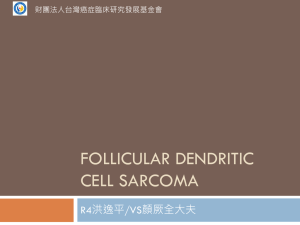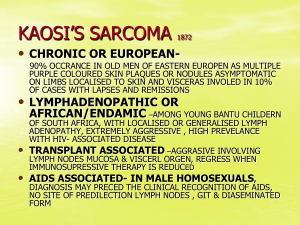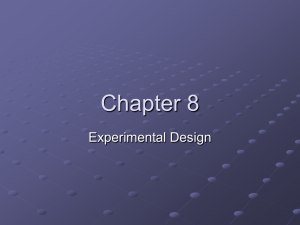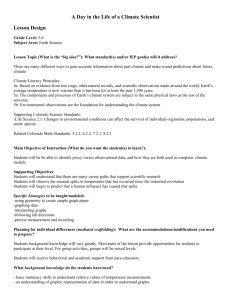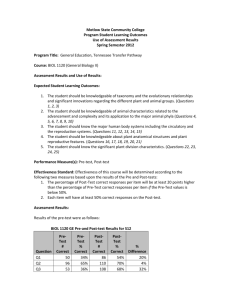Histiocytic Sarcoma Pre-Test
advertisement
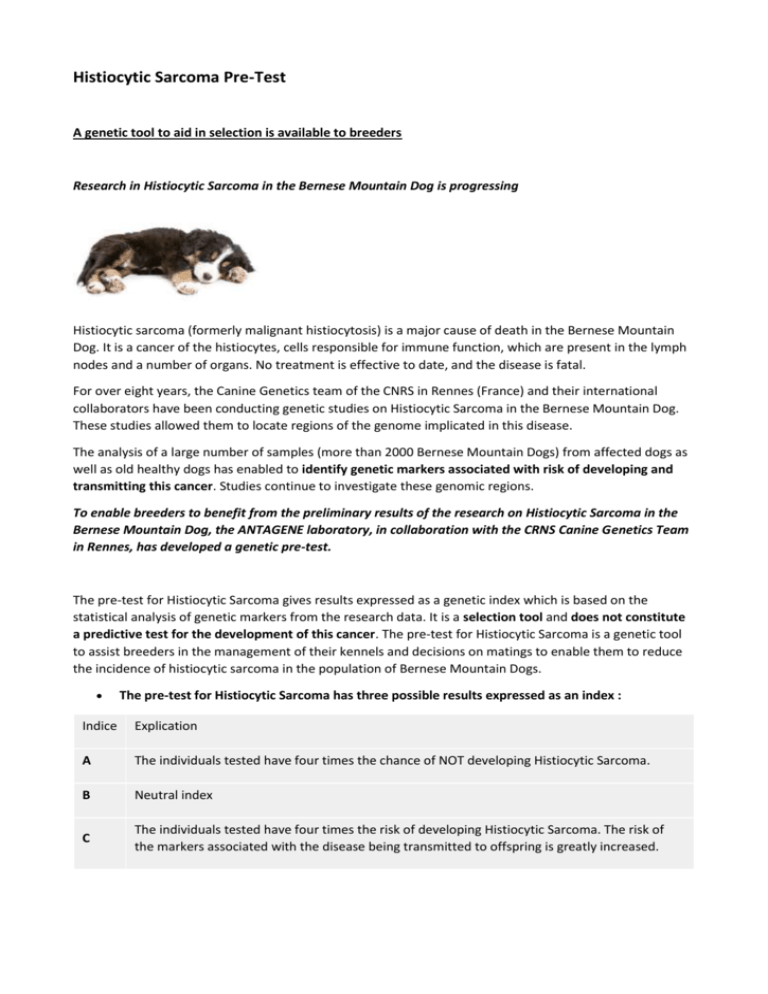
Histiocytic Sarcoma Pre-Test A genetic tool to aid in selection is available to breeders Research in Histiocytic Sarcoma in the Bernese Mountain Dog is progressing Histiocytic sarcoma (formerly malignant histiocytosis) is a major cause of death in the Bernese Mountain Dog. It is a cancer of the histiocytes, cells responsible for immune function, which are present in the lymph nodes and a number of organs. No treatment is effective to date, and the disease is fatal. For over eight years, the Canine Genetics team of the CNRS in Rennes (France) and their international collaborators have been conducting genetic studies on Histiocytic Sarcoma in the Bernese Mountain Dog. These studies allowed them to locate regions of the genome implicated in this disease. The analysis of a large number of samples (more than 2000 Bernese Mountain Dogs) from affected dogs as well as old healthy dogs has enabled to identify genetic markers associated with risk of developing and transmitting this cancer. Studies continue to investigate these genomic regions. To enable breeders to benefit from the preliminary results of the research on Histiocytic Sarcoma in the Bernese Mountain Dog, the ANTAGENE laboratory, in collaboration with the CRNS Canine Genetics Team in Rennes, has developed a genetic pre-test. The pre-test for Histiocytic Sarcoma gives results expressed as a genetic index which is based on the statistical analysis of genetic markers from the research data. It is a selection tool and does not constitute a predictive test for the development of this cancer. The pre-test for Histiocytic Sarcoma is a genetic tool to assist breeders in the management of their kennels and decisions on matings to enable them to reduce the incidence of histiocytic sarcoma in the population of Bernese Mountain Dogs. The pre-test for Histiocytic Sarcoma has three possible results expressed as an index : Indice Explication A The individuals tested have four times the chance of NOT developing Histiocytic Sarcoma. B Neutral index C The individuals tested have four times the risk of developing Histiocytic Sarcoma. The risk of the markers associated with the disease being transmitted to offspring is greatly increased. Advice to breeders on the use of the index It is important within a breeding population to give priority to individuals with the best index but is also of the utmost importance when selecting breeding pairs that sufficient genetic diversity is maintained in the breed. This genetic pre-test should be just one of the many selection criteria. Recommendations An Index C dog with a number of other positive qualities should not be removed from the breeding programme, rather it should only be mated with individuals showing Index A or B results. Mating programmes should be planned to avoid C x C matings. Being a selection tool, the SH pre-test is only available to breeders. What is the procedure for requesting the pre-test for Histiocytic Sarcoma ? • Download and sign two copies of the Memorandum of Agreement • Send ANTAGENE: - The blood sample in an EDTA tube (cheek swab accepted for puppies less than 3 months old) - The completed ANTAGENE sample certificate (tick antagene SCORING and specify “SH pre-test”), signed and stamped by the veterinarian. (For samples sent only within the framework of the research, tick “sampling for research”) - Payment or proof of payment of the amount of EUR 105 per pre-test you have ordered - A signed copy of the Memorandum of Agreement (first order only) • To help research, please send a copy of the pedigree to ANTAGENE and complete the clinical questionnaire for each dog. It is important to fill in this online clinical follow-up questionnaire regularly (click here) • The result of the pre-test is communicated only by postal mail in within 4 to 6 weeks Why is it important to continue with the research ? The pre-test for Histiocytic Sarcoma is not an end but a continuation of the research on Histiocytic Sarcoma. The pre-test will be optimized and refined with advanced research. For this your participation is essential. Participation in research is free and all information submitted concerning the dog and its owner, will be treated with confidentiality. For further information about participation in the research : CNRS Canine Genetic Team, Rennes (France) Email : cani-dna@univ-rennes1.fr Website : http://dog-genetics.genouest.org
